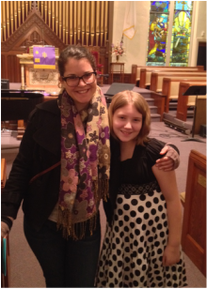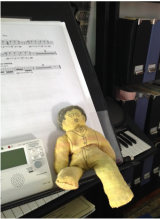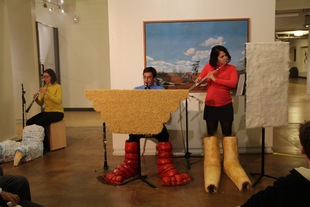ON TEACHING

You know, it actually doesn’t matter to me all that much if students remember the themes from Beethoven’s 5th Symphony or anything else. I mean, it would certainly be great if they remember the themes, but ultimately, what is way more important to me is that they learn the skill of being able to appreciate something that they previously didn’t understand. Because THAT skill, they can use for the rest of their lives. And if they don’t learn that skill, then… they’re trapped with the knowledge and experience they currently have… and that’s so limiting. I know just as well as anyone that what we don’t know is scary and sometimes feels unapproachable, but if these can start to feel that there are actually entry points into classical music, then they can make that leap in other realms of their lives. Then, I feel like I’ve really helped.
---
When a student doesn’t do well… I try not to take responsibility. I mean, it certainly has something to do with me, but I can’t physically make someone do the work required. So, likewise, I try not to take too much credit in their successes. It’s their proud moment, I think. I mean, I’m certainly happy when my students do well, but as far as pride? I don’t think I would want to claim pride. That just feels a little dangerous and self-defeating.
---
---
When a student doesn’t do well… I try not to take responsibility. I mean, it certainly has something to do with me, but I can’t physically make someone do the work required. So, likewise, I try not to take too much credit in their successes. It’s their proud moment, I think. I mean, I’m certainly happy when my students do well, but as far as pride? I don’t think I would want to claim pride. That just feels a little dangerous and self-defeating.
---

I really want my students to learn how to be their own teachers. I can’t be there for them forever, so the sooner I can get them thinking on their own, the better. I remember when I was in school, and I felt like I could only play well when my teacher was there to help me. And so, a friend made a little bean bag doll of my teacher and told me to put it on my music stand while I practiced. It sounds ridiculous, and perhaps has the possibility of being creepy, but the idea that my teacher was always there with me was something that I held on to. I still have that doll…
That teacher I had, I loved him so much. I still love him. Always platonically, of course, but very intensely. I became a formed person during the 6 years I studied with him, and I remember how hard it was for me on the occasions when he disappointed me. Now, from the opposite side of things, I understand how hard it probably was for him. Students expect so much, without even realizing what they’re asking. I have a lot of things going on, but also… I make mistakes. Just as my teacher sometimes upset me by canceling a lesson or something of the sort, sometimes I make mistakes as a teacher. So, I’ve learned to be vulnerable in my teaching. I tell students I made a mistake. I tell them I’m sorry and that I’ll try not to let it happen again, and that I’m still there for them as a whole, even if I did let them down on some particular instance.
---
That teacher I had, I loved him so much. I still love him. Always platonically, of course, but very intensely. I became a formed person during the 6 years I studied with him, and I remember how hard it was for me on the occasions when he disappointed me. Now, from the opposite side of things, I understand how hard it probably was for him. Students expect so much, without even realizing what they’re asking. I have a lot of things going on, but also… I make mistakes. Just as my teacher sometimes upset me by canceling a lesson or something of the sort, sometimes I make mistakes as a teacher. So, I’ve learned to be vulnerable in my teaching. I tell students I made a mistake. I tell them I’m sorry and that I’ll try not to let it happen again, and that I’m still there for them as a whole, even if I did let them down on some particular instance.
---

I’m a strong proponent of interdisciplinary performances and cross-curriculum teaching. If we want to keep music in the schools, we have to show its impact. To show that impact, we have to involve it in the rest of the curriculum and compare results. Of course the results will be better when more learning modalities are incorporated into the lesson plans. The same goes for performances: the audiences will be wider and more far-reaching when you can interest more people. That seems obvious, right? But it goes further than that… the art-lovers who came to a new music concert simply because it was at a sculpture exhibit leave and are then interested the next time they read about a performance of new music. And, the so-called ‘normal’ concert goers are more aware of art exhibits… THAT’S how we’re going to survive… in the schools, in the community, and in the culture.
---
Whatever I do (and the specifics change from year to year), I try to make it known to my students what I’m doing outside of school. I want to be a complete artist, and for me, that means living in a place where I can perform and be in the midst of other performances. I’m a better teacher when I’m a better musician, partially because I’m happier when I’m performing, but even more-so, because I’m just legitimately more immersed in the musical world, and I can portray that to my students.
---
Music careers, in our current 21st century world, are difficult. We have to learn that they won't necessarily take on the form as that of our role models, our idols, our classical music rock stars. And you know? That can be hard to accept. But once you do, once you realize that you really can make your own opportunities, the musical world is large and bright. You can create situations that truly fit who you are, personally and musically; you can shape your career and teaching to be exactly what it needs to be. Because, no matter what the model, our world will always need music. We've evolved as musical beings, and that's not going to go away. If anything, humanity is starving for more; it's up to us to put it out there.
---
Whatever I do (and the specifics change from year to year), I try to make it known to my students what I’m doing outside of school. I want to be a complete artist, and for me, that means living in a place where I can perform and be in the midst of other performances. I’m a better teacher when I’m a better musician, partially because I’m happier when I’m performing, but even more-so, because I’m just legitimately more immersed in the musical world, and I can portray that to my students.
---
Music careers, in our current 21st century world, are difficult. We have to learn that they won't necessarily take on the form as that of our role models, our idols, our classical music rock stars. And you know? That can be hard to accept. But once you do, once you realize that you really can make your own opportunities, the musical world is large and bright. You can create situations that truly fit who you are, personally and musically; you can shape your career and teaching to be exactly what it needs to be. Because, no matter what the model, our world will always need music. We've evolved as musical beings, and that's not going to go away. If anything, humanity is starving for more; it's up to us to put it out there.
Susanna Loewy, 2015 Grammy Music Educator Video, Essay #2 (answer as applicable)
- How you are making a measurable difference in the lives of your students?
- How you are making a significant impact on your school and the surrounding community?
- How you are making significant and lasting contribution to the field of music (research, etc...)?
- How have you demonstrated a commitment to the broader cause of advocacy for maintaining music education in the schools?

